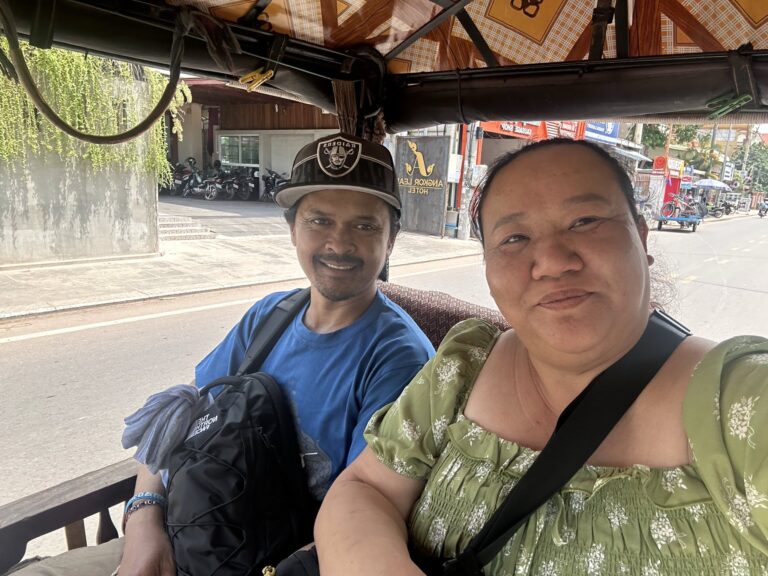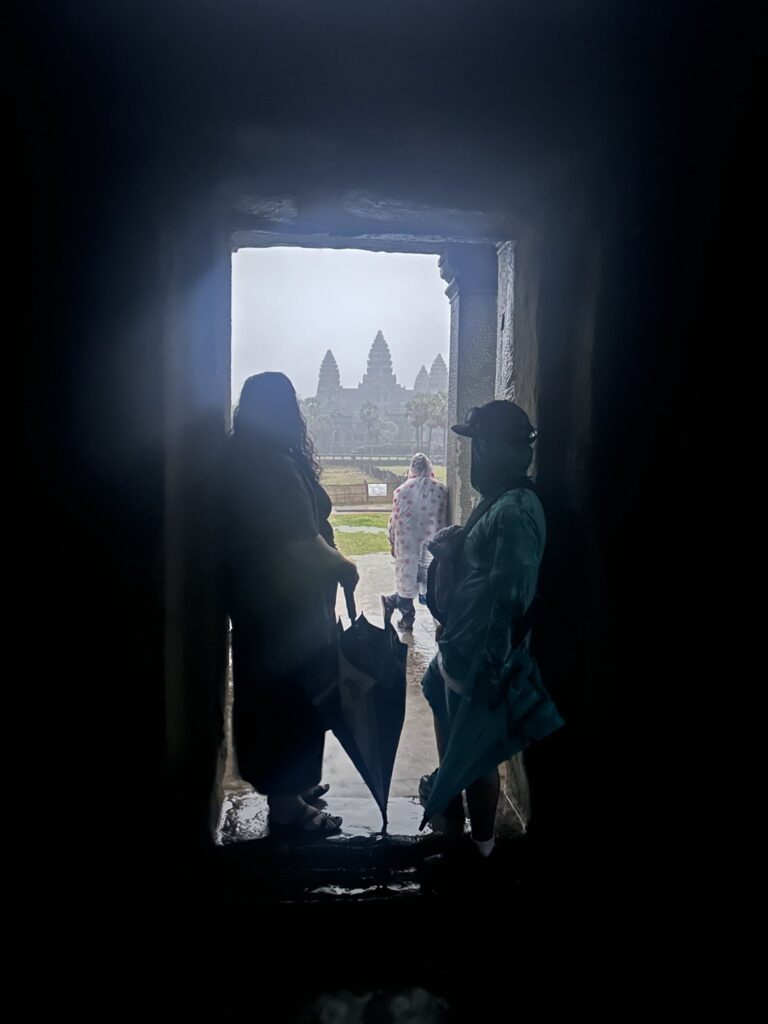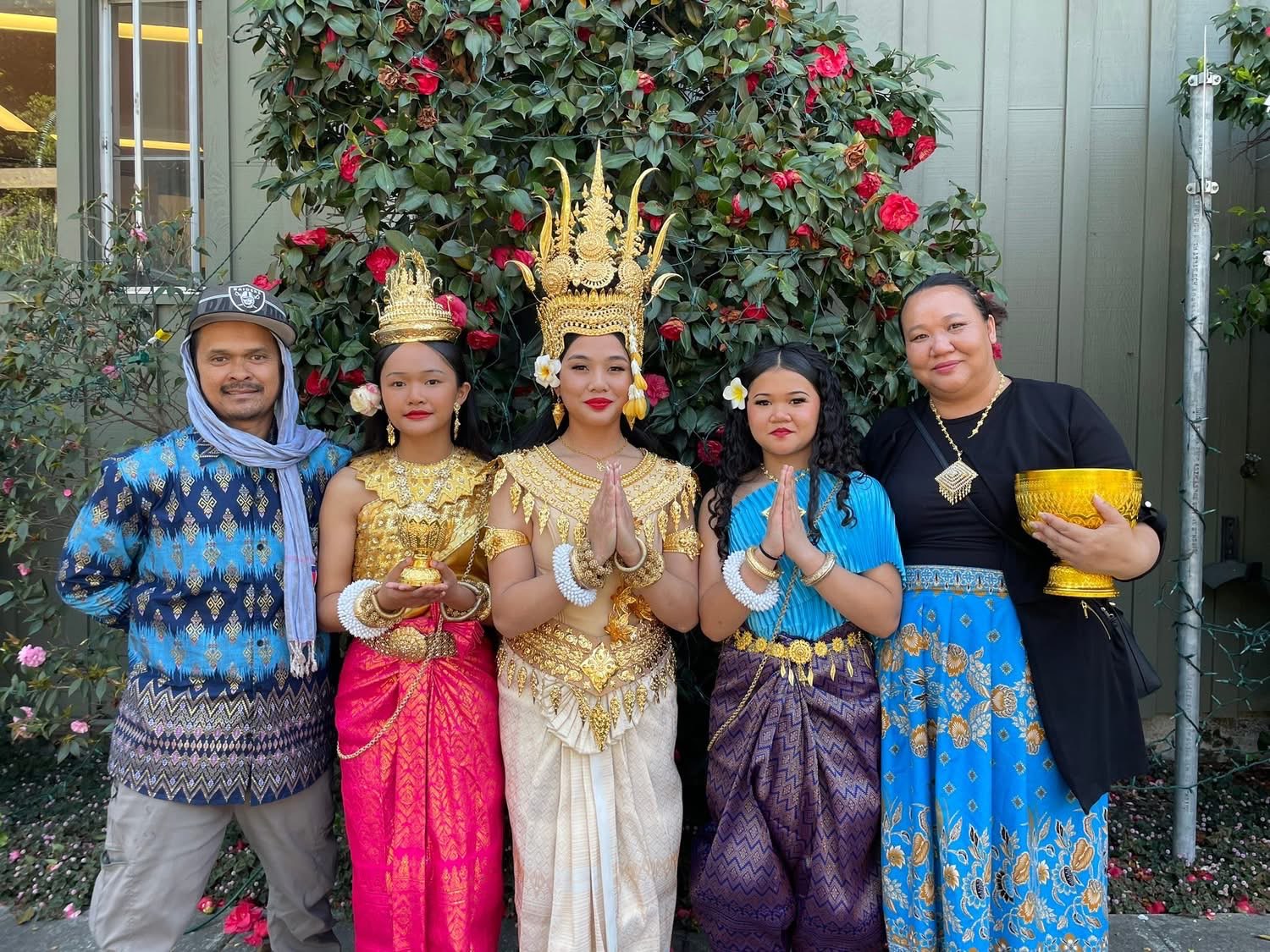In March, Kites to Southeast Asia (SEA) traveled to Cambodia to visit with deported community members and their families to hold resource fairs and social events. Kanley Souet-Pich, Program Manager at the Center for Empowering Refugees & Immigrants (CERI), and her husband participated in this year’s trip. In this reflection, Kanley, shares her family’s journey from her husband Roeun’s ICE detention to their fight against deportation and the significance of community care.
2025 marks 50 years since the end of the U.S. wars in Southeast Asia, the beginning of the Khmer Rouge genocide, and the largest refugee resettlement in American history. As part of Kites to SEA, we honor these histories by uplifting the voices of those most impacted by displacement and deportation. Kanley and Rouen’s (a New Light Fellow) story is one of separation, strength, and return.
A Promise to Come Home
Before Roeun’s detention, our lives were simple but full–raising five children, fishing on weekends, and trying our best to make ends meet. Beneath the surface, however, we always lived with an unspoken fear: deportation.
Our fears became a reality in 2019. An ICE letter instructed Rouen to turn himself in and prepare for deportation. I had been applying for a pardon, but felt helpless reading that notice over and over, each time feeling like a part of me died. Still, I had to stay strong for Rouen and our children.
I found guidance through organizations like CERI, where I met Elijah Chhum. He invited us to a meeting with “other impacted families.” I didn’t fully understand what that meant until I witnessed other Khmer families requesting help for their loved ones. One grandfather had driven from the Central Valley; on his knees and hands folded in a sampeah, he pleaded for help to stop his son’s deportation. At that moment, I understood what “impacted” meant. Everyone in that room was going through the same pain. Wives and parents carried the voices of the directly impacted. One of the organizers told us, “We will fight ICE.” I told Roeun, “You will be detained, but keep hope. You will come home.”
Our community showed up. Friends, strangers, lawyers, elders, and strong Asian woman leaders like Ny Nourn and Sarah Lee rallied with us and carried my family in various ways. My eldest daughter, Moragaut, gave a speech at the Capitol at a Mother’s Day rally, and my mother-in-law spoke publicly for the first time. We weren’t alone.
The fight was exhausting, but three months later, Rouen’s conviction was vacated. We headed straight to a Cambodian restaurant where he ate like I had never seen before. His mom showered him with rice at the front steps to cleanse him. Our kids rushed out to greet him with tears of joy and sadness.
Ultimately, the journey of surviving crisis, discovering our power, and organizing with the community produced a powerful commitment: to fight for other families like ours facing separation.
Today, I serve as a Program Manager at CERI, where I run support groups for women and community members impacted by deportation and help them navigate complex mental health challenges.
Through a grant from NBF and support from Kites to SEA, Elijah launched CERI’s New Light Program—a tele-mental health service for deported community members in Cambodia. This work revealed a deep, urgent need for mental health care and eventually led to the formation of New Light Wellness, which centers returnees* mental health and healing.
Return to the Motherland: Carrying Lived Experience into Collective Healing
Joining the Kites to SEA delegation to Cambodia was not just a return but a continuation. We carried our family’s grief and lessons into shared spaces of healing, honoring our journey and supporting others on similar paths.
It had been 20 years since I last returned, and for Rouen, it was his first time back in his motherland in 40 years. Landing in Phnom Penh, the heat was overwhelming. I was struck by how much the city had changed—bigger, faster, more Westernized. Hearing English spoken and seeing the new developments made me feel both amazed and sad. I remembered the smell of fish markets, the quiet streets, and less air pollution when I visited with family. This time, I was here as an organizer, carrying different responsibilities and emotions.

I was nervous for Roeun. We invited two men he had been detained with to our first social event in Phnom Penh. Although they had stayed connected online, I wasn’t sure how it would feel for them to reunite in person after everything that had happened. Each of their journeys had taken a different path: while Roeun was able to return home to the U.S., they had been deported to Cambodia. I knew there could be complicated emotions beneath the surface. When they finally arrived, they hugged and didn’t stop talking. All my anxiety melted away. It was a powerful reminder of how deep the bonds are between people who survive separation and trauma together.
I sat with the impacted men’s wives and partners at the Phnom Penh resource fair held at Tiny Toones, an NGO founded by a returnee. They shared fears I knew well—the fear of losing their husbands and that their lives could change in an instant. Even though we lived oceans apart, we were connected by the same fear. Sharing my own story of my blended family and second chances helped build trust and create space for honest connection. They also spoke about communication struggles with their partners and worries about community judgment.
In Battambang, the pace slowed, and I felt more at home. Surrounded by nature and open spaces, it finally felt like I could breathe. Meeting directly impacted folks living there reminded me that even in isolation, people find ways to create community, whether through fishing or quiet gatherings.
The New Light Wellness fellows led the resource fairs in Siem Reap and Phnom Penh with confidence and heart. Seeing them step into leadership and support newly arrived deportees made me so proud. It gave me hope for what’s possible when impacted people lead the work.
Throughout the trip, I watched Roeun come alive. He spoke with leadership; he listened and learned with intention. In the journal he kept during the trip, he wrote, “Going back to Cambodia is a once-in-a-lifetime opportunity for me. I haven’t gone back in 40 years since I was born in genocide. This meant a lot to me to go to my birth homeland, my culture, my ancestors, and the people of Cambodia. I’m very grateful, and I feel blessed being surrounded by amazingly great leaders.”
At Angkor Wat, he stood in awe, finally seeing in person the place he had only read about. Under the rainy sky, we made a promise: next time, we would bring our children to stand on this land with us.

As we flew home, I reflected on how far we had come. Not just the distance between Cambodia and Oakland but also the emotional and spiritual journey as a family. What began as a fight for Roeun’s freedom became a commitment to healing rooted in love and community. This trip reminded us that we are not defined by separation but by how we protect and care for each other. We return with more than stories; we carry the responsibility to keep showing up, to build, and to remind others that healing is possible, even within systems designed to divide us. Returning to Cambodia wasn’t just going back—it was a powerful step forward in healing and reclaiming who we are.
*The term ‘returnee’ refers to a refugee or internally displaced person who has returned to their country or area of origin to remain there permanently. However, they are not yet fully reintegrated into their community. (UNHCR)
–
Since 2019, the Kites to Southeast Asia (SEA) coalition has organized to support community healing and movement building across borders to deported community members in Southeast Asia. The coalition consists of Asian Prisoner Support Committee (APSC), Center for Empowering Refugees & Immigrants (CERI), MN8, New Light Wellness, and New Breath Foundation.
